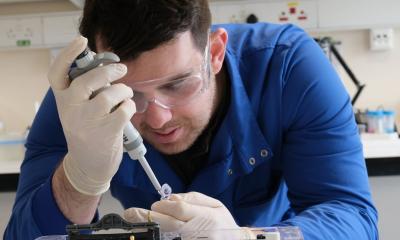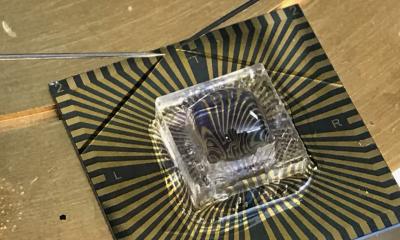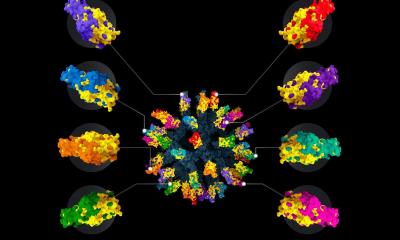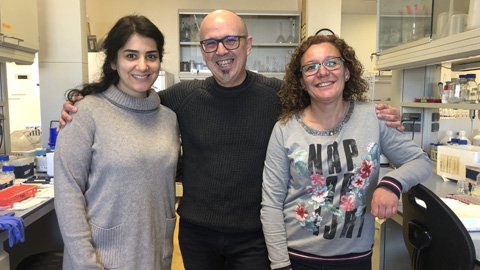
Image source: Universitat Autònoma de Barcelona
News • Protein-based nanostructures show promise
Nanoparticles to neutralise SARS-CoV-2
Researchers at the Universitat Autònoma de Barcelona (UAB) have developed spherical, biocompatible and stable nanostructures that bind to the spike protein with high affinity and prevent cell infection.
The modular and self-assembly strategy used by the researchers would allow them to be adapted to fight other viruses and to design molecules with a high antiviral capacity. The research has been published in the journal ACS Applied Materials & Interfaces.
Nanomaterials inspired by amyloid proteins are gaining interest in nanotechnology, due to their modularity, controlled self-assembly and stability. A key advantage of these materials is the possibility of incorporating protein molecules with the desired functionality through genetic design. However, many are unsuitable for biomedical applications, as they are insoluble and cannot be administered in body fluids.
Researchers at the Universitat Autònoma de Barcelona (UAB) have developed a new type of nanoparticles inspired by the structure of amyloids, capable of neutralising the SARS-CoV-2 virus. The nanostructures, named OligoBinders, are soluble, biocompatible, and stable in plasma and have a high potency to bind viral particles. This binding blocks the interaction between the virus spike protein and the ACE2 receptor on the cell membrane responsible for the infection. The research has been led by Salvador Ventura and Susanna Navarro, researchers from the Department of Biochemistry and Molecular Biology and the Institute of Biotechnology and Biomedicine (IBB) at the UAB.
To develop the nanoparticles, researchers exploited the self-assembly capacity of a small yeast peptide, named Sup35, to which they fused two miniproteins, LCB1 and LCB3. These miniproteins are formed by three helices, are very stable, and establish multiple contacts with the viral protein. Their modular approach allowed them to design two spherical nanoparticles, each carrying more than 20 copies of LCB1 or LCB3 on their surface. “This fact gives the nanoparticles great avidity for the virus and allows them to bind simultaneously to several spike proteins", explains Susanna Navarro.
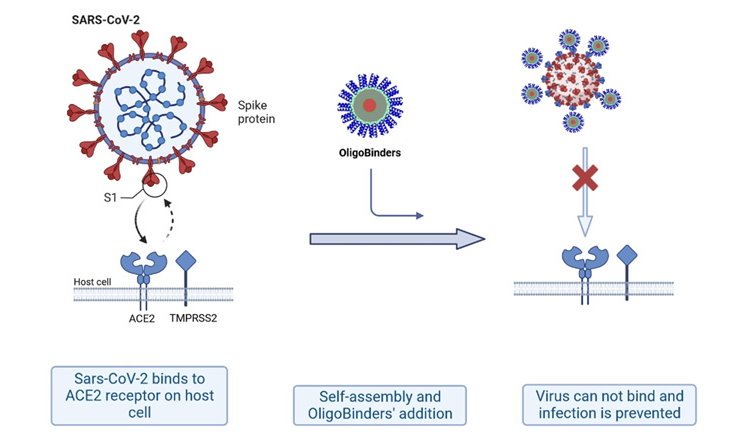
Image source: Universitat Autònoma de Barcelona
The researchers, who have carried out their study on particles similar to the SARS-CoV-2 virus (SC2-VLP), highlight the great inhibitory power of these new nanoparticles and their potential as an efficient alternative to the use of monoclonal antibodies for capturing or neutralising the virus.
The developed nanospheres could have applications in biomedicine, for example, in self-administered nasal treatments, in biotechnology, to produce diagnostic kits, or as a potential prophylactic agent. In addition, large-scale production would be easy and inexpensive, as assembly occurs spontaneously after incubation of the molecules. "The modular strategy we propose could be adapted for other viruses of interest, incorporating the corresponding inhibitory domain to the nanoparticle. In addition, it offers the possibility of building nanoparticles that combine two or more functional regions, which would simultaneously target different molecules of the same virus, to create molecules with enhanced antiviral activities in the future", says Salvador Ventura.
Source: Universitat Autònoma de Barcelona
02.03.2023



